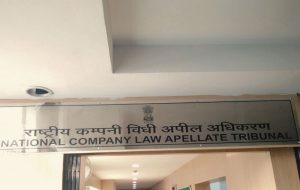National Company Law Appellate Tribunal (NCLAT): The Division Bench of Justice Anant Bijay Singh, Judicial Member and Shreesha Merla, Technical Member held that the Banks cannot freeze accounts, nor can they prohibit the ‘Corporate Debtor’ from withdrawing the amount as available on the date of the moratorium for its day-to-day functioning.
Instant appeal was filed by Bank of India, Central Bank of India, Syndicate Bank and State Bank of India against the National Company Law Tribunal’s decision wherein the Adjudicating Authority allowed the application filed by the Resolution Professional under Section 14 read with Section 17 and Section 60(5) of the Insolvency and Bankruptcy Code, 2016.
Resolution Professional had sought a direction against the appellant Banks and Financial Institutions to reimburse the amounts appropriated by them after Insolvency Commencement Date, together with the amount appropriated towards interest payments and further to resume the working capital limits as available to the ‘Corporate Debtor’ as on the Insolvency Commencement Date.
Analysis, Law and Decision
Tribunal noted that the main case of the Appellant Banks was that this Tribunal vide an Order dated 09-08-2017 passed an interim order directing the Company to be run as a going concern, engaging all Banks where the Company had accounts, to co-operate with the IRP for the operation of the accounts.
Further, the IRP requested the banks to make available the limits which were subsisting as on the date of commencement of the process of Resolution. The LC facility was continued on request of the erstwhile RP and the LC Bills negotiated by the beneficiary Banks were retired by the ‘Corporate Debtor’. The amount was paid by the Company into their Cash Credit Account so that fresh LCs could be opened within the sanctioned limits to purchase necessary raw materials to keep the Company a going concern.
Section 17(1)(d) of the Insolvency and Bankruptcy Code states that the Financial Institutions maintaining the accounts of the ‘Corporate Debtor’ have to act on the instructions of the Interim Resolution Professional in relation to such accounts and furnish all information relating to ‘Corporate Debtor’.
Bench reiterated that Banks cannot debit any amounts from the account of the ‘Corporate Debtor Company’ after the Order of moratorium, as it amounts to the recovery of the amount.
Moratorium Period
Tribunal expressed that Section 14 of the I&B Code overwrites any other provision contrary to the same and any amount due prior to the date of CIRP cannot be appropriated during the period of moratorium.
Keeping in view the above discussion, Bench opined that merely because the ‘Corporate Debtor’ had enough liquidity to run the Company as a going concern, the act of the Appellant Banks to adjust the credit balance in the Cash Credit Account towards the debit balance after CIRP commenced, cannot be justified.
Present appeal failed and hence was dismissed.
Further, the new management of the ‘Corporate Debtor Company’ sought the release of the title deeds of the Immovable Properties of the Company which were in possession of Bank of India.
Applicant stated that the non-applicant Bank declined to release the title deeds as conformation from Canara Bank was pending. Though vide an email Bank of India had cited ‘Issuance of No objection Certificate by Canara Bank’ as the ground for non-release of the title deeds.
Further, Section 31 of the Insolvency and Bankruptcy Code was referred which provided that the terms of the ‘Resolution Plan’ are binding on the Company, its employees, creditor and stakeholders. Clauses 3(c)(vii) and 3(c)(viii) of the Plan contemplate that title deeds are required to be released immediately upon distribution of Resolution Process.
Therefore, Bench held that since the debt had been legally extinguished, therefore withholding the title deeds and preventing the Company from being able to create security interest for securing the non-convertible Debentures issued to the Debenture Holders, in terms of the Plan would be unjustifiable.
Tribunal allowed the release of title deeds for effective implementation of the terms of the ‘Resolution Plan’.[Bank of India v. Bhuban Madan, 2021 SCC OnLine NCLAT 189, decided on 28-05-2021]
Advocates before the Court:
Appellants:
Mr Rajiv Ranjan, Sr. Advocate alongwith Dr Sudhir Bisla and Mr Rahul Adlakha, Advocates.
Respondents:
Mr Abhinav Vashisht, Sr. Advocate alongwith Mr Rajat Bector and Ms Charu Bansal, for R-1.
Ms Malak Bhatt, Mr Saurav Panda and Ms Anannya Ghosh, Advocates.

